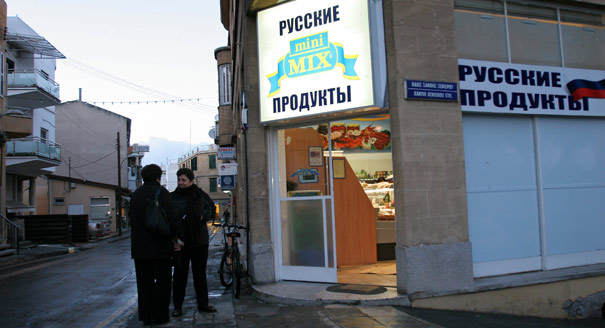The Russian government, the Russian business community, and the Russian media were all initially shaken by the terms of the Cypriot bailout. President Vladimir Putin called the deal unfair, unprofessional, and dangerous; Prime Minister Dmitri Medvedev compared it to confiscation; Sberbank’s chief executive Herman Gref strongly criticized it; and even some liberal newspapers detected traces of an anti-Russian conspiracy.
The shock, however, was short-lived. The losses turned out to be not as big as immediately feared, and the inevitable demise of Cyprus’s offshore banking could actually help the Kremlin domestically. However, the Cyprus episode is having a considerable impact on Russian attitudes toward crisis-stricken Europe.
Above all, the Russians have discovered that private property is not as sacred a principle with their EU neighbors as they had believed. Not only shares in troubled banks, but deposits, too, can be confiscated.
The Russians, of course, are no strangers to expropriation. Memories of their own 1998 default are still fresh, and many people still remember losing their lifetime savings following the Soviet Union’s collapse, when annual inflation reached 2,500 percent. When the USSR was alive and well, it used to periodically rob its own people in the guise of currency reforms.
But all of this happened in Russia; present-day Europe was thought to be immune from such uncivilized behavior. No longer, many Russians would argue.
Another lesson that the Russians have learned is that using an EU country as a transaction hub is not necessarily safe. When Cyprus decided to impose capital controls, quite a few Russian companies, some of them state-owned, found themselves unable to move their money: the hub stopped functioning.
Cyprus, of course, was not just any hub. In 2011, it accounted for over one-third of all outward investment from Russia and over a quarter of all foreign direct investment into Russia.
Having burnt money in Cyprus, the Russians are becoming wary of other potential trouble spots in the EU. This affects not just Slovenia or the countries of southern Europe, but also Latvia, which has recently been trying hard—and with a certain amount of success—to lure rich Russian investors. Now Russians know that the Eurogroup can take decisions in strict secrecy, presenting the rest of the world, including Russia, with a fait accompli.
So much for the painful lessons. Yet, arguably, the Cyprus episode has come at an opportune moment for the Kremlin. For several months, Putin has been trying to make Russian officials and politicians repatriate their money—or quit from public office. Once the terms of the Cypriot bailout were made public, Russian television broadcast footage of Putin trying ten years ago to persuade wealthy Russians to keep their assets at home.
What may not have seemed convincing enough then may be more so now. The Russian government, for its part, is promoting “de-offshorization” of the country’s economy. In order to destroy any remaining illusions about the government’s stance, the country’s Deputy Premier Igor Shuvalov said Moscow would not compensate Russians who have lost money in Cyprus.
Russia, which last year agreed to lend Cyprus $2.5 billion, has now decided against extending its aid package to the island. Moscow was clearly unimpressed with the Cypriot authorities’ handling of the situation. Nicosia’s offer to let Gazprom explore and exploit its offshore gas fields was seen as unattractive and, in view of Cyprus’s division and Turkey’s position, potentially dangerous. Basically, the Kremlin has decided to cut its losses.
Yet even with Cyprus reduced, in the Russian mind, to a string of sunny beaches, it is unlikely that Moscow will be able to stop further capital flight. After all, Russian money came to Cyprus in search of institutions that were absent at home. Capital outflows continued when the judicial and police reforms heralded during the Medvedev presidency were seen as shams.
When the Cypriot crisis began, Medvedev, now prime minister, floated the idea of founding a domestic Russian offshore zone in the country’s Far East, a suggestion that many professional economists dismissed as both stale and ludicrous.
Nor do Russians place much trust in their president. For all Putin’s stated interest in improving Russia’s investment climate, few analysts expect him to focus on the rule of law and judicial independence.
After Cyprus, Russian money will seek new foreign destinations—many of them, like Luxembourg and Malta, within the EU. Russia’s relations with Europe, however, continue to be redefined. Most Russians think that the Eurogroup’s decision not to spare the wealthy depositors of Cypriot banks was prompted by Germany’s desire to stop the flow of “dirty” Russian money to the EU. Berlin, once Moscow’s main friend and advocate in Europe, is visibly toughening its stance vis-à-vis Russia.
For a long time, Russia’s preference was for a more united, German-led Europe. Last month, Moscow unexpectedly found itself on the receiving end of that leadership. The wailing in the Kremlin has stopped. The experience will stay.











